From Myanmar to Georgia – highlighting the breadth of the Society’s activities
On Thursday 29th June we welcomed Stephen Simmons for a launch of his book, Maymyo Days: Forgotten Lives of a Burma Hill Station. The book relates the forgotten lives of people who summered at a Burma Hill Station including Henry Morshead, a Royal Engineer who got to within a shout of the summit of Everest with George Mallory, Princesses Ma Lat and Yadana Nat Mai – Shan Princesses, General Po Yay – a Karen who won an MC in Burma during the war and who was eventually forcibly displaced by Ne Win, ‘Elephant Bill’ of the Bombay Burma Trading Corporation, Charlotte Wheeler Cuffe who painted orchids and rhododendron in Burma, a superb, ‘amateur’ artist whose work is deposited at Glasnevin Botanical Gardens in Dublin. We still have four books available at the discounted price of £30. If you would like one please contact info(at)royalasiaticsociety.org. And if you would like to hear the talk it is available on our YouTube channel:
On Wednesday 5th July we welcomed Alan Babington-Smith and Melinda Liu from the Royal Asiatic Society, Beijing, China. As part of our bicentenary celebrations we are hoping to host lectures either in person or online by representatives of many of the allied Asiatic Societies. So it was a delight to host Alan and Melinda for their talk, The View from the RAS Beijing: China, Technology, Community and the Future, in which they shared the story of the survival and thriving of RASBJ including tripling their membership through the pandemic years by harnessing new technologies to bring like-minded people together. We would like to wish them much future success as RASBJ moves forward into their second decade.
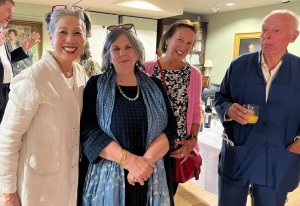
Our next event is on Monday 17th July when Joshua Ehrlich, from the University of Macau, will launch his new publication, the East India Company and the Politics of Knowledge. In the book, Ehrlich posits that a commitment to knowledge was integral to the Company’s ideology and how the Company cited this commitment in defence of its increasingly fraught union of commercial and political power. All are welcome at the Society’s premises for the lecture at 6.30 p.m., or you can join online. Please contact Matty Bradley on mb(at)royalasiaticsociety.org to obtain the online link.
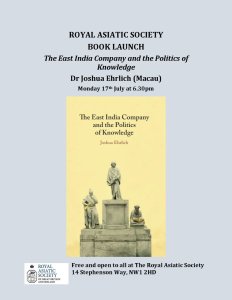
The event following, will expand on this theme of histories of the East India Company. On Friday 4th August, 6.30 pm. we will hold a panel discussion, New Histories of the East India Company, when Joshua Ehrlich will join Professor Margot Finn (UCL) and Professor Philip Stern (Duke University) to discuss their various findings in their newly published books.
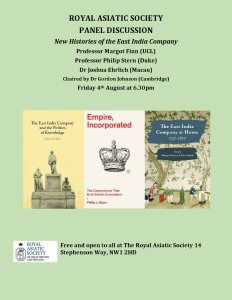
In Collections News:
Next week, our new Collections Assistant, takes up her post. Dr Amy Matthewson will be joining us for six months to assist with reading room and collections duties, and to aid in the preparations for the forthcoming bicentenary exhibition at the Brunei Gallery in October this year. We first met Amy when she was a PhD student and volunteered at the Society, cataloguing our Chinese glass slides. This was our first collection of glass slides to be catalogued (we currently have 10 collections catalogued and we have a new volunteer starting in July who will be working on the remaining uncatalogued ones). The China slides were also subsequently digitised and can be seen on our Digital Library. We look forward to Amy working with us again. Once she’s had chance to settle in, we’ll give her the opportunity to introduce herself via a blog post.
And, in the title of this post, I promised you Georgia. Many of you will remember that the Society acquired the Papers of Terence Gray in 2022. Since acquiring the papers I, Nancy Charley, archivist, have gradually been working through them to create a basic list and house them in appropriate packaging. I’ve lost count of the number of rusty paperclips I’ve removed. There are now only a couple of boxes of material left to sort so I thought I would write a little of what I’ve discovered. The whole donation falls into four distinct but overlapping sections.
There is a small quantity of material relating to Terence Gray’s time working as an archaeologist. This is a lesser known part of his life – he is more famous for his time in theatre at Cambridge and for his research into Chinese philosophy with the adoption of the name Wei Wu Wei. But in the 1920s Gray took part in excavations in Egypt with the British School of Archaeology in Egypt (BSAE) working under Guy Brunton and directed by Flinders Petrie. The collection contains a number of photographs many of which were printed at Turners’ Cameral Exchange, Pink Lane, Newcastle upon Tyne, and are still in their original covers.
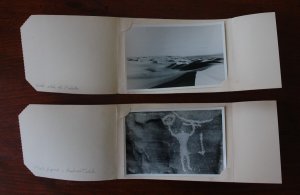
The above examples have pencil labels but not all of the photographs have identifying details. However, we have already been contacted by a researcher interested in this part of the collection who may also be able to help in future identification.
A significant part of the collection relates to Gray’s interest in Chinese philosophy and the books he published under the pseudonym Wei Wu Wei. The papers include draft manuscripts, correspondence with publishers and correspondence with other people interested in the field. His publications include Fingers Pointing Towards The Moon; Reflections of a Pilgrim on the Way, first published in 1958 by Routledge and Kegan Paul; All Else Is Bondage; Non-Volitional Living, first published in 1964 by Hong Kong University Press; and Unworldly Wise; As the Owl Remarked to the Rabbit, published 1974, also by Hong Kong University Press. For these, and his other publications, there are draft manuscripts in both English and French.
The two other parts of the collection are the ones which relate to Georgia. In 1957, Gray married Princess Natalia Margaret Bagrationi of Imereti (Imeretinsky) and they both became deeply involved in discovering more about the history of the Bagrationi dynasty to which Natalia belonged. She helped to establish and administer the Conseil de Bagration for which they researched extensive historical and genealogical information, and corresponded with exiled members of the Dynasty around the world.
But also alongside the research and official documentation are some personal papers including a large amount of correspondence between family members and a good selection of photographs. Natalia’s mother was Margaret Fitzherbert Wright, who grow up at Yeldersley Hall and among the papers are Margaret’s school reports and essays from The Beehive, a school in Bexhill-on-Sea in Sussex. She briefly married Patrick Kinnaird, before marrying Natalia’s father, Michael Imeretinsky. These papers of Margaret form just one small part of the whole collection, which also includes Michael’s papers relating to being a Air Force pilot, reparations for damage to their home in World War II and photographs of many generations of the family.
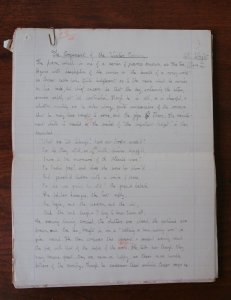
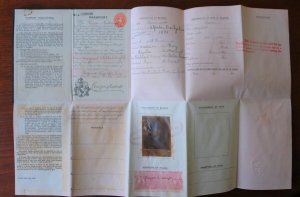
I have obviously only included the broad brushstrokes of the collection but the papers are now available for research, so if they are of interest to you, please get in contact.
